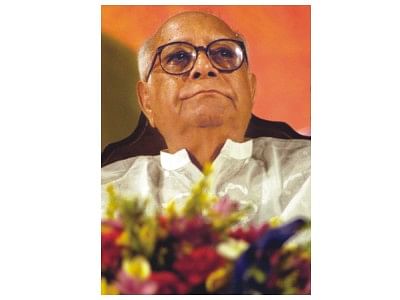Kalim Sharafi: Epitomising Tagore songs

Kalim Sharafi, celebrated Tagore singer, passed away yesterday due to old age complications. When I heard the news, I was saddened. My mind travelled back to an early summer afternoon when we engaged in a relaxed conversation on music and its place in life. The wonderful raconteur that he was, Kalim Sharafi related many an interesting episode from his eventful life.
An account:
“Cream? Sugar?"
That was so typical of Kalim Sharafi, or “Kalim Bhai”, as he is known to us. No sooner had I arrived at his Bailey Heights apartment, he'd become a busy host.
"There's actually an anecdote behind my question..." went on Sharafi. "Tagore had often frequented the hill station, Mongpu at Darjeeling. There, the host, and author Maitreyi Devi had once asked Tagore if he wanted cream or sugar with his tea, he'd answered, "I drink tea mainly for cream and sugar".
That was the other side of Kalim Bhai. If he wasn't on stage performing Rabindra Sangeet or leafing through Tagore's work in his free time, he was reminiscing on Tagore's quips. For a man who had performed Rabindra Sangeet for over six decades and was known as "the man with the golden voice" not only to the audience but the musical greats such as Devabrata Biswas, Hemanta Mukhopadhyay, Suchitra Mitra, Kanika Banerjee as well, this was hardly surprising.
Even within the various niches of Rabindra Sangeet, Sharafi, was perhaps most loved for his timeless patriotic songs. In fact, his association with the political movement of his generation has been one of the key inspirations behind his songs.
"Many people would actually be surprised that I didn't get admitted to Shantiniketan because of my political convictions! I was seen as "left leaning" and that didn't go well with Professor Anil Chandra, the principal at that time," said Sharafi.
“While I was in jail, I had come into contact with several people such as Pronob Guhothakurta who was arrested from Shantiniketan. I got the taste of Tagore songs from him and was soon inspired into singing the songs.”
Reading my thoughts, he immediately went on. "Why was I in jail? Those were the turbulent days of the Quit India movement initiated by Gandhiji. I had appeared for my matriculation. During this time many of us were arrested and sent to jail for 11 months. In fact, in jail, I had come into contact with some noted pro-Liberation leaders like Kamoda Prasad Mukherji, Kobiraj Nrisingho Sen and Dinkor Koishik.
When Sharafi joined Indian Peoples Theatre (IPTA), renowned singers Suchitra Mitra, Hemanta Mukherjee and Debabrata Biswas frequented the organisation and that's how he rubbed shoulders with the stalwarts and his interest in Tagore songs was spurred. It is at the same time his guru, Shubho Guhothakurta, made a tremendous impact in his development as an artiste, added Sharafi.
President, of Bangladesh Rabindra Sangeet Shilpi Sangstha, until his death, Sharafi's contribution to the cultural setting in Bangladesh is well noted. Around 1957, he along with professor Anisur Rahman and Dr. Rafiqul Islam organised several cultural programmes, including Tagore's dance drama “Tasher Desh” in Dhaka under the banner of 'Hojoborola'.
Even after his death, Sharafi, an epitome of Rabindra Sangeet, will continue to inspire generations of music lovers. His unmatched renditions of patriotic songs will continue to resonate in the hearts of millions across the nation and beyond.

 For all latest news, follow The Daily Star's Google News channel.
For all latest news, follow The Daily Star's Google News channel. 



Comments